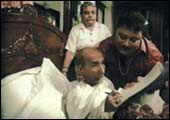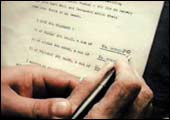


 |
| This recent advertisement for a sealant didn't
end all that well for the unscrupulous heir. But reality is
very different; that's why you should read this article on wills
and will-making |
There's
something the Indian psyche finds distasteful about the practice
of writing wills. ''I am not going to die tomorrow,'' snaps Siddharth
Shriram, Chairman of SIEL, when asked if he had made one. It's the
association with death that draws reactions such as this but a will,
says Max New York Life CEO Anuroop 'Tony' Singh, is pretty much
like ''life insurance; you don't think of it in the normal course
of life''. The business of insurance, courtesy competition, has
grown-by 60-65 per cent in the past year by some estimates as compared
to 20-22 per cent the year before-and thanks to changing value systems
(Shriram, after all, is a businessman from the old school) more
people are writing wills.
Wills weren't all that imperative in a milieu
where the extended joint family was the norm. ''Family property
is usually locked (in) by laws and the power of disposition is limited,''
explains Zubin Morris, a partner at law firm Little & Co, which
helped the late Aditya Birla draft his will. ''So, members of joint
families often don't bother to write wills.'' Joint families, though,
are on the way out, and an increasing awareness of legal issues
is driving more people to write (and register) their wills. ''People
take the writing of wills more seriously now,'' says Dr Abhishek
M. Singhvi, the late Madhavrao Scindia's counsel during the contesting
of Rajmata Scindia's will. ''They even videotape themselves doing
so (writing their wills).''
It isn't hard to make a will out in India.
All one needs to do is put down everything on paper (type it, preferably
so that courts may be spared the trouble of deciphering handwriting),
find two witnesses-a doctor as one would be ideal; he or she can
attest that the testator (as the person making the will is called)
is of sound mind-and roll. Registering a will isn't mandatory although
it does assure the document's 'legal sanctity'.
Registration is no insurance against the will
being contested, something that happens to most in India, ''especially
because property is at stake,'' says Rajiv Dhavan, a Delhi-based
lawyer. The grounds on which a will can be contested cover pretty
much everything, from questions on its authenticity to issues relating
to the mental health of the testator. And if the will favours someone
outside the immediate family, they can always contest it, and things
could drag on and on...The childless owner of Manmohan building
in North Delhi's Yusuf Sarai-one of those typical Delhi buildings
with rabbit warrens that pretend to be offices-willed it to a university.
His nephews and tenants convinced another university that he had
wanted to bequeath the property to it. Today, 30 years after his
death, the universities are still battling it out in court. ''Our
legal system encourages litigation as opposed to settlement,'' rues
Dhavan.
|
Will-making 101
|
|
»
If there is anything unusual in your
will, make sure you clearly explain why.
»
Ensure that someone knows where
your will is so that no fake wills crop up after your demise.
»
Keep your will updated at all times
and remember-it's the last one that counts.
»
It is good idea to have a doctor
as a witness so no one can say you wrote it after losing your
marbles.
»
Don't be lazy-get your will registered
as soon as possible. At the end of the day it does count for
something.
|
If contests are one part of the problem with
wills, inadequate drafting is another. In one instance, a prominent
Delhi-based businessman bequeathed his house to his widowed daughter-in-law.
A subsequent will left the property to his daughters and asked the
daughter-in-law to vacate the house by a certain date, but gave
her a portion of the proceeds of the sale of the house. Only, the
will didn't say anything about how and when the house had to be
sold.
A will, for those of you who don't know this
already, is revocable and can be superseded by another will. The
last will is usually the valid one. A much talked about case is
that of Rajmata Vijayaraje Scindia's will. A handwritten, 11-page
will, dated September 20, 1985, was produced after her death by
her Secretary, Sardar Angre. This will disowned her son Madhavrao
Scindia. Law firm Crawford Bayley and Company said it possessed
a later will in which the Rajmata had named her three daughters
as executors, but would not disclose its contents. The 1999 will
only further complicated an ongoing battle, one that the New York
Times observed would almost certainly have, ''an even lengthier
afterlife in the leisurely Indian legal system.''
So, what's all this talk of missed (or embattled)
inheritances doing in the personal finance section of the magazine?
Only this: everyone-no matter if your worldly possessions comprise
dud stocks, a house in Cochin that hasn't seen any appreciation
in value in 10 years, and a 1988 Maruti 800-needs a will.
That's one. Two, be very clear in your mind
as to what you wish to do with your assets. List movable and immovable
assets separately. And remember to include a rationale for seemingly
inexplicable decisions. ''If you want to leave your property to
one person and not the other, you should include a reason; otherwise
the will can be contested,'' says Avantika Keswani, a Delhi-based
lawyer. Also remember to dot your is and cross your TS lest poor
drafting skills undermine your intent.
Do you need a will? Actually, everyone does;
especially people with a family. Indeed, as some recent cases show,
if you don't make your will, someone else could (this actually happened
to an Indian settled in Malaysia; someone who knew about his holdings
in India forged a will and got it registered). That's why registrars
have increasingly moved to the practice of attaching the testator's
photograph to the will.
The growing relevance of wills (or drafting
wills), says Max New York Life's Singh, is actually a business opportunity.
''Alas, no one has marketed wills as a product; what a great idea.''
We agree.
|

